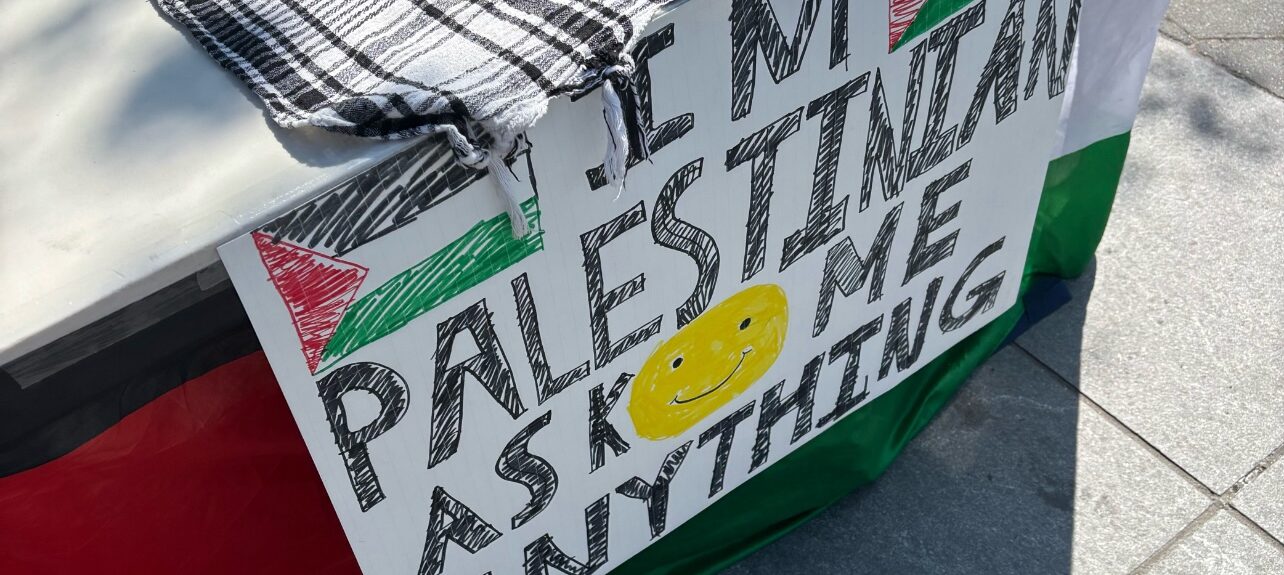Politics Race Religion
Table talk on peace, Palestine, Israel
By Mia Baghout
From a distance, an onlooker watched the man approach and study the poster board-sized sign. “I’m Palestinian. Ask me anything,” it read.
What the man said in response, said Liliana, was this: Get up. I want to sit in your chairs, change places with you.
Liliana and Romeo – who, fearing for their safety, asked that their last names not be used – did get up from the folding table they’d set up, taping the red, green, white and black flag of Palestine to the front.
They let the onlooker talk. He called them uneducated, even though one of them recently graduated from Rutgers University with a degree in economics and the other is in law school.
“Some people come over very hostile,” Liliana said, “but were willing to have a very open and understanding conversation. To say, ‘I’m Palestinian,’ all of a sudden it means I hurt a certain group … [It] associates us with so many different things.”
The table her brother and she set up in Washington Square Park aimed to invite a conversation, not stop people from talking, at a time when there seems to be so much shouting, they said.
“We’re willing to discuss where they’re coming from, where we’re coming from … and exactly what points we can’t seem to agree on,” she said.
There are those who are hostile, they said, like the man who said they were uneducated. That man, they recalled, demanded that the siblings trade places with him, letting him sit in their chairs. He had compared Palestinians to bunions that needed to be cut from aching feet.
There also were those willing to talk about peace. The ones who said, basically, “We are Zionists. And we don’t believe what some other Zionists believe. We believe there should be a middle ground.”
Adam Saleh, a YouTuber Liliana and Romeo grew up watching, approached the table one day and gave them high-fives. Then, against their aims and wishes, Saleh said, “Keep the Zionists away,” then posted that on TikTok.
That was the opposite of what the brother and sister were aiming for. “His demeanor that day was, like, it kind of went against everything we are trying to do,” said Liliana, who founded the Palestinian Student Organization at Seton Hall University.
Their Washington Square Park table and the conversations they hope will take place there are about eliminating danger for everyone everywhere and, right now, in Palestine. There, more than 60,000 people have been killed by bombs, bullets or starvation since the current war started.
The Israeli government has retaliated against Palestine after Hamas’ October 2023 attack, killing 1,200 Israelis and taking more than 250 people hostage.
Liliana said she values conversations and questions from everyone. “We don’t want to dismiss people.”
Before they set up the table in Washington Square Park this summer, Liliana’s Palestinian Student Organization at Seton Hall organized an open discussion on campus for students to discuss their views. About 100 people attended, students from varying backgrounds. Some students cried. Many opinions were shared.
“Nothing offensive was said. It was just so intense,” Liliana said.
At Rutgers, Romeo said, Zionist students had set up a table to share their views. He’d talked with those Jewish students. It was civil.
“We would talk about the conflict, our ideas, our political values and, like, what we see as best fit for the future,” Romeo said.
Later on, he set up his own table at Rutgers, answering questions from a Palestinian perspective.
Later, scouting a place to have a wider, bigger conversation, the two settled on Washington Square Park. “Everyone’s in New York,” Liliana said, of their decision to come to a city where there are many more people, perspectives and assumptions.
Instead of being on social media, where arguing, not reasoning, seems to dominate, they wanted to talk to people face-to-face. Maybe that would make people more willing to listen and hear one another out.
“So, like, I just want to normalize having conversations that go beyond comment sections on social media where you can’t really indulge in it.”
Liliana wants to take conversations offline and into real life. She said a mother had approached her and her brother, explaining to the two that her 17-year-old son was too embarrassed to come over to the table. Liliana doesn’t want people to avoid asking questions.
“That’s exactly what we want to work against,” she said. “We’re willing to talk about it beyond what you’re seeing on social media.”


